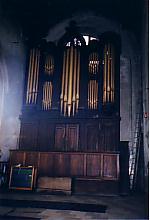
Gustav Holst the composer fell in love with Thaxted on first sight when he arrived in the winter of 1913. He and his wife Isobel stayed at the Enterprise, a small guest house in Town Street for a five-day walking holiday. They enjoyed their visit, the people and the town so much that he was determined to return. The following year, Holst leased a small house called Monk Street Cottage, and he and Isobel settled in to make Thaxted their home.
It was a difficult time in England. World War I had just started and anyone with a name such as von Holst (which was his full surname) was looked upon with skepticism and distrust. Holst was eyed with suspicion, especially as he was seen walking alone for hours each day. This came to the attention of the local police constabulary who felt obliged to keep a watch on the strange man as he walked around the village. A policeman’s report noted, “Many rumors are current about this man, but nothing can be traced against him.”
Slowly Holst began to make friends but there was one person in particular, Conrad Noel, who became a close friend. Conrad was deeply involved with village life and introduced Holst to members of Saint John the Baptist Church and the choir. Soon Holst was known warmly as “our Mr. Von” and in 1916 he organized, conducted and played the organ at the Whitsun Festival. One weekend, he brought students from London to join with the Thaxted choir in an unforgettable time of singing and rejoicing. A member of the congregation was quoted as saying that Holst could make the organ “speak.” The organ Holst used to compose some of his famous works is still in Saint John the Baptist Church.
Here in this peaceful town of Thaxted, Holst was able to work on his Planets Suite as well as many of his other symphonies. In 1924, while recovering from a bout of illness, he completed Choral Symphony and wrote to a friend, “It has been wonderful to sit all day in the garden and watch the symphony grow up alongside of the flowers and vegetables, and then to find that it is done!”

